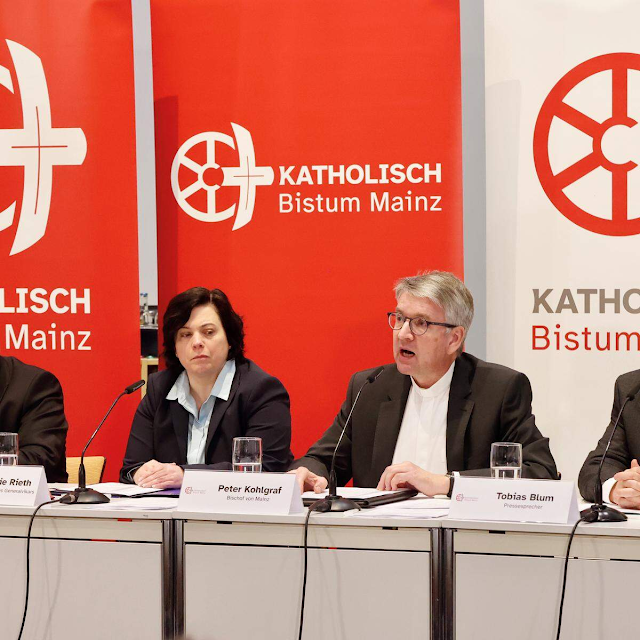Parish and bishop at war over former parish priest accused of abuse
Allegations of abuse against parish priest
Bishop Kohlgraf clearly tells off the parish in Eppertshausen
These are clear words with which the Bishop of Mainz, Peter Kohlgraf, criticises members of the Catholic parish of St. Sebastian in Eppertshausen. They had aggressively attacked a high-ranking representative of the diocese because they wanted to protect their parish priest.
It was a memorable parish meeting on Sunday a week ago in Eppertshausen. The mood was aggressive to hostile when the Vicar General's representative in the Diocese of Mainz, Stephanie Rieth, wanted to explain to the congregation the proceedings surrounding the abuse allegations against the retired parish priest of Eppertshausen, Harald Christian Röper. Numerous parishioners unreservedly came to the defence of Röper, who is still not allowed to return to Eppertshausen, and sharply criticised Rieth and the Diocese. This has now made waves up to the highest level in the diocese: in a letter, the Bishop of Mainz, Peter Kohlgraf, addressed the parish in Eppertshausen and criticised their behaviour unusually clearly. The head of the Bachgau pastoral area, Alexander Vogl, read out the letter at the weekend during the service in Eppertshausen. We reproduce the letter here in full, in the form provided by the diocese. The Bishop writes:
"Dear Parishioners in Eppertshausen,
It is an urgent matter for me to write you a letter in these days. Among other things, I understand it as my reaction to the visit of the Vicar General's plenipotentiary, Ms Stephanie Rieth, who came to talk to you on my behalf on Sunday, 23 April, in order to answer questions about the personnel decision concerning your long-serving parish priest, Harald Röper, which has upset you.
I understand that the current situation is stirring many of you emotionally. When someone has been pastor of a parish for many years, close relationships have grown. I have heard various accounts of the evening mentioned. Emotions are understandable for me. However, I cannot accept how Mrs Rieth was dealt with that evening.
In the Diocese of Mainz, we act according to guidelines that were developed in a long struggle, also with representatives of politics and representatives of those affected; they apply throughout Germany. And it is good that we have these guidelines. We in Mainz have been able to read the opposite picture in the EVV study. There we see the decades-long practice of a church that cares little about the law. Let me make it clear: I no longer want such a church. The church is not a lawless space, no matter in which area. Not reacting and covering things up does not solve problems, but exacerbates them. Consistent processing includes passing on reports to the Public Prosecutor's Offices for investigation. But it is also part of the process that we always carry out an ecclesiastical procedure, taking into account the result of the prosecution procedure. We are guided by the perspective of those affected and at the same time take responsibility for those accused. We believe those affected and at the same time uphold the presumption of innocence until the outcome of the church proceedings.
Ms Rieth explained these connections in the congregational meeting last Sunday. On that evening, Ms Rieth was not listened to, insinuations and even personal insults were uttered in loud interjections, which others supported with applause. I consider such behaviour unacceptable, and even more unworthy of a Christian community. Even with differing opinions and assessments, we must not forget mutual respect; insults and hysteria already abound in our society. At least the willingness to listen would have been a necessary basis for the success of this evening. This hostility also reaches me personally in various letters. Even in the church, the loudest are not automatically right.
Therefore, I do not want to conceal the fact that other voices from Eppertshausen have also reached me. There are people among you who are ashamed of the behaviour of others that evening and ask for apologies. I am not surprised that these people did not speak out that evening and certainly on other occasions. Rather, it shocks me that this is not possible in a Christian community.
From another congregational context of my former activities, I can only invite you to avoid anything that contributes to a lasting division of the congregation. Because this division will poison community for a long time. The foundation for a good community must be laid and maintained by all together. I can only warmly encourage you to do so.
I would like to add a word about our decision-making in the diocese. No single decision is made by anyone alone; experts are involved. It is a little surprising when, without specific background knowledge, the diocese and its leaders are portrayed as incompetent or biased.
I thank those who are helping to objectify the issues in these days and who are trying to maintain unity on a full-time and voluntary basis. I wish them all God's blessing and ever more willingness to reach out to each other. From our side, the offer to talk remains, but under different conditions."
Cathcon: The Bishop should have been at the meeting in the first place. Failing that his Vicar General. Background on the role of Ms Rieth in the Diocese and the larger battle for the soul of German Catholicism.










.jpeg)

Comments